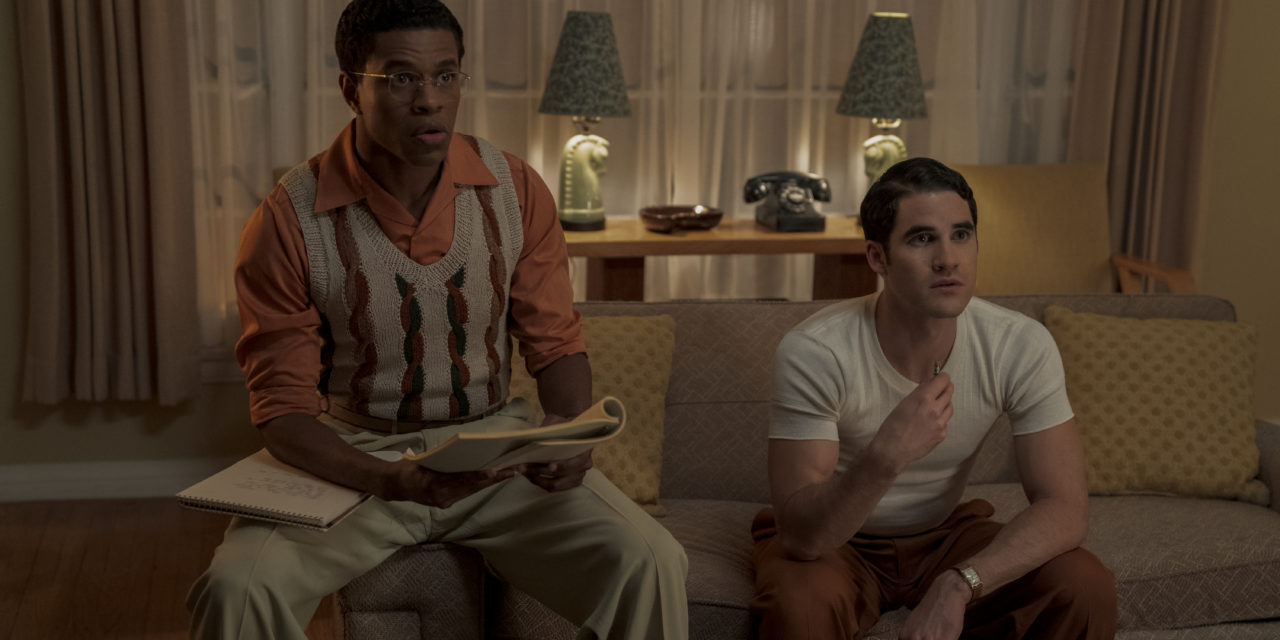Hollywood is famous as the city of dreams… of course, many of those dreams are broken ones. And it’s not uncommon for literature and even films to focus on the dark underbelly of those in satellite to success on the silver screen. The most famous is probably Nathaniel West’s The Day of the Locust, a format that looms large over Ryan Murphy’s latest limited series: Hollywood, which debuts with all of its seven episodes dropped tomorrow. It’s a cynical and sometimes heartless dissection of Tinseltown, but oh-s0-well done.
It begins in the late 1940s with Jack (David Corenswat), a veteran with a new wife, a baby on the way and no job. But he has — say it with me — the dream of breaking into movies. At present that amounts to waiting at the gates of Ace Studios each morning, hoping to be picked to serve as an extra in a war picture or romance and making a day rate. That never happens. So he takes a job with Ernie (Dylan McDermott), a dandyish barfly who ones a gas station where “full service” means more an exchange of fluids than a flushing of them. Jack agrees to gigolo it with the older ladies (including Patti LuPone), but draws the line at being gay for pay. So he elicits an actual gay guy, Archie (Jeremy Pope, pictured left), to come onboard as his wing man.
Archie himself has aspirations — not as an actor, but as a screenwriter. But he’s black, and there are no black screenwriters at this point, at least none under contract. His dreams are boxed in by his race and his sexual orientation, but he still has them. And he has talent. Surely that will be enough, eventually, in a meritocracy. No? Well, who said the movie machine is meritocracy? (Irma P. Hall never became a movie star; Sean Young did.)
Murphy’s brand has become more formula than style: His shows always seem desperate to reinvent themselves every 20 minutes or so — it’s the definition of Short Attention Span Theater. We aren’t through the first 45-minutes episode before several major characters have given us their “I wish” speeches, progress and regressed, been bucked up and beaten down. But Murphy makes it work, as he did with his previous Netflix original, The Politician. He embraces the outsider element boldly, and doesn’t shy away from sex and nudity and in-your-faceness. He also decorates the scenes with lovely period costumes, sets and dialogue, as well as references to underground gay culture of the day (Rock Hudson, Cole Porter).
He also reassembles some of his usual company of actors (McDermott, Darren Criss), with some welcome additions (LuPone, Holland Taylor, Jim Parsons). Corenswat is a slightly bland central figure (that’s part of the character, though), but Pope is an astonishingly charismatic screen presence. You cant take your eyes off him.
There’s a downside to bingeing new TV shows; we don’t get the chance to process the craft and construction as we rush headlong into the next episode. It can be exhausting. Which is why I haven’t watched all seven episodes yet; I want to enjoy the experience of letting them unfold with mystery and appreciation. Hollywood is, after all, still the stuff of dreams.
— Arnold Wayne Jones












